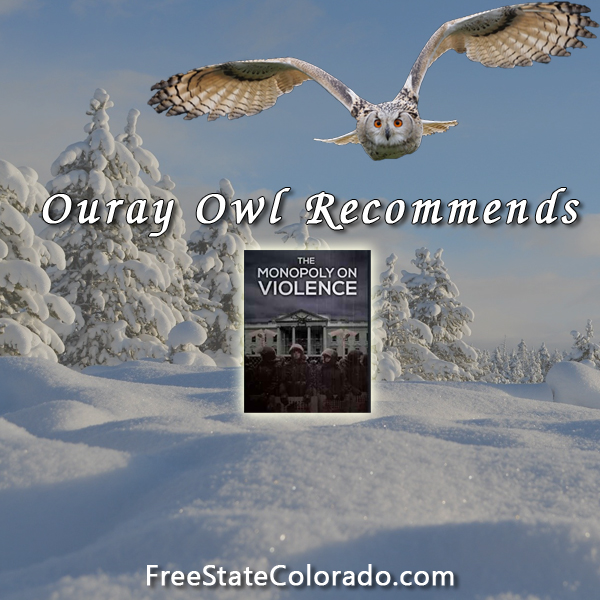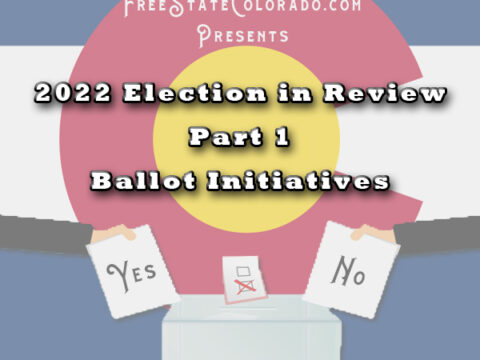The snow is finally falling in the metro area my friends!
Colorado usually gets the most snow every year in March, and this year it is a beautiful sight!
I hope you are staying warm by the fire with a warm cup of tea and a good book.
If you are looking for a fascinating, and educational video to watch this weekend, I have a recommendation for you.
The Monopoly on Violence
If you want to read my notes on this great video, scroll down past the embed. Note: All timestamps will direct you to the video on YouTube.
You can also watch on Odysee, Bitchute, or Telegram.
This documentary was produced by Stateless Productions, and premiered June 1st, 2020.
Who is Stateless Productions? According to their website:
Our mission is to create films that accurately convey the problems of state violence in an engaging manner to a mass audience. Pete, Robert & Chris are Atlanta-based voluntaryists who met via social media. Stateless Productions, LLC was formed in December 2018 and they just released the documentary, “The Monopoly On Violence”. We are currently in production on our second crowdfunded film, “America’s Police Crisis”.
Source: https://statelessfilm.com/about-us/
The Monopoly on Violence features some of the most prolific names in modern Libertarian/Anarachist thought, and analyses the State, and it’s impact on society.
It does a great job of showing the nature of modern slavery, and shatters the illusion that we are ruled by consent.
The documentary traces the history of states, political philosophy, and anarchist thought.
Part 1- The State explores the history of Early States, and their development into the Modern States.
The first person to appear is James C. Scott, historian and author. (Timestamp)
Scott explains that the modern state, with regular tax collection is a recent creation.
In his book, Against the Grain, Scott explains that Early States came to power over centralized populations whose concentrated food production kept them locked into a specific geographical area, such as a flood plain.
States were then able to use tax collection, centralized punishment, and a centralized monopoly of violence to exert control over the people.
The documentary then continues to introduce us to some of the great minds of libertarian thought:
Stephan Kinsella, the great anti-intellectual property philosopher and lawyer explains how the European model of government was embodied in the idea of the Protestant Reformation, in which God’s decree was given to the common man. (Timestamp)
Andrew Napolitano, explains how Madison gave us a government where individuals granted power to the government, the opposite of what the European model was. (Timestamp)
Jeff Deist, talks about how the modern State has developed to the point where power is so centralized that 1% of the population dictates to the rest of us. (Timestamp)
Thaddeus Russel‘s segment on the history of Education, I found especially interesting, i.e. the Prussian model creates citizens, workers and soldiers through regimentation, turning man into machines. (Timestamp)
Schools are prisons, teaching children to be productive slaves in our modern authoritarian society.
As the conversation moves onto the idea of taxation, Jeff Deist describes taxes as a tool of compliance and terror.
Deist says, taxes are the burden we bear to ensure we are docile and frightened of our government agents.
Author Donnie Gebert explains how the State comes up with excuses to steal more of our money. (Timestamp)
The discussion turns to Central Banking, which gives the State control over economies through the ability to manipulate interest rates and the money supply.
Sandy Klein, a Professor at Baylor University explains that because feds borrow so much money, they benefit from low interest rates. (Timestamp)
Through central banking, the State can spend more on waging wars and empire expansion.
Joseph Salerno provides the context that in the past monarchs would be restrained in waging war, because they run out of money, and if the American people had to pay directly for the Vietnam War, it would have ended much quicker. (Timestamp)
Peter Klein mentions the great Randolph Bourne quote, “War is the Health of the State,”
i.e. the State benefits from war because it is an excuse for tyranny, wherein people sacrifice real liberty for perceived security. (Timestamp)
Daniel McAdams, of the Ron Paul Institute for Peace and Prosperity, talks about how US Foreign Policy ends up having to solve problems they created. This self-perpetuating cycle of war maintains the State’s power over society. (Timestamp)
The Great Scott Horton explains the truth that America uses Jihadis for Empire Maintaining. The simple truth is that our Gov’t supports terrorists. In fact, America is on both sides of the terror wars. America has acted as Al Qaeda’s air force. The Govt is not fit to be our security force because “our security is not it’s priority.” (Timestamp)
The movie then explores Democide.
It is estimated that 256 million people were killed by their own govt in the 20th century.
Mark Thornton says the greatest indictment against socialism/communism is that they killed millions of their own citizens, through outright slaughter, starvations, etc. “The biggest problem in the world, in terms of modern history, has been communist dictators killing off their own citizens.” (Timestamp)
Social Contract is the next topic discussed.
CU Professor Michael Huemer discusses the three versions of the social contract: 1. The Explicit Contract Theory, wherein individuals agree to be part of a Government, John Locke believed this actually happened. 2. The Implicit Contract Theory, in which subsequent generations go along with the Explicit Contract of the previous generation. 3. The Hypothetical Contract Theory, where a State acts in the interest of the citizen because the citizen would hypothetically agree to the State’s actions. Huemer believes the Conquest Theory is more accurate than the mentioned contract theories. States have gained power through usurpation, military coup, an outright conquest. (Timestamp)
Huemer brings up a great concept of including a question on consent in our tax returns. If you agree with the Gov’t, you can pay taxes. If you do not, you do not have to pay!
Deist continues on the myth of the social contract. There is no explicit contract in which the State offers services in exchange for tax money. The State is a monopoly provider, and monopolies determine their own prices. (Timestamp)
The sham of Democracy is the next subject tackled.
Huemer starts by dismissing the notion that the laws that get passed are ones that are supported by the majority of the people. The truth is, laws get passed that most people don’t support. However, even if the majority supported the laws, a wrong cannot be turned into a right by majority support. (Timestamp)
The great libertarian comedian Dave Smith shares the Tom Woods analogy of replacing Walmart-controlled schools with Gov’t-controlled schools. If children were indoctrinated with Pro-Walmart Propaganda, would it be surprising that they would support Walmart when they grew up? (Timestamp)
Russell brings up the great point that things that question the existence of gov’t legitimacy are left out of the history books. (Timestamp)
The movie moves from an examination of the State to The Case Against the State.
David Friedman begins by explaining that “individual actors in gov’t are not bearing the net costs of their actions.” For individual rationality to lead to group rationality, individuals must bear the benefits and costs of their actions. However, in a political market, costs are distributed across the country or community. (Timestamp)
Napolitano expands the argument by bringing up the Commerce Clause in the US Constitution, which has led to absurd regulations and unprecedented gov’t abuse. (Timestamp)
Patrick Newman explains that businesses want privileges from the State, and need to block hostile regulation that threaten them. This is why businesses get involved in the political system, playing both offense and defense. (Timestamp)
Smith shares a personal story to show how cops have nearly absolute power over you. This leads to a situation where power corrupts. (Timestamp)
Peter Quinones, one of the producers of the film explains that police have a monopoly of force in our society, they can kill you if you do not abide by what they have to say, and mostly get away with murder.
International Law is then explained as a system in which there is no overarching authority. This is an anarchic system in which mostly-equal States interact with each other for mutually beneficial reasons.
Colorado native Ryan McMaken speaks about the self-governance of international law, where States work together. (Timestamp)
Kinsella elaborates with the notion of international law as a model of a stateless society: “I’ts possible to have peace among actors that are decentralized, and that are sovereign with respect to themselves, and don’t have an overlord that forces them to comply with some kind of set of rules.” The International Order disproves the Hobbesian notion that a ruler is needed.
McMaken continues the discussion as to how this might work with individuals. Just keep adding choices for individuals regarding political systems.
Anarchism, it’s meaning, and history are the next topic. (Timestamp)
Starting with Ancient Greece and China, the film traces the history of Anarchist thought.
There are many philosophers mentioned during this topic: Socrates, Zeno, Winstanley, Armond, Rousseau, Godwin, Stirner, Chomsky, Goldman, Proudhon, Bakunin, Kropotkin, Warren, Tucker, De Molinari, Spooner, and Murray Rothbard. A very interesting and information-packed segment!
David Gordon talks about Rothbard’s intellectual curiosity and wide-ranging knowledge.
The great Walter Block spells out three principles of libertarianism. The Non-Aggression Principle (NAP), which means, “Keep your mitts to yourself, and don’t grab other people or their property without their permission;” Private Property Rights, and Free Association. The purest libertarian view in Block’s opinion implies the illegitimacy of gov’t. (Timestamp)
Friedman discusses how rights are not as cut and dry in the real-world. For example, a man falling out a 14th-floor window grabs a flagpole, and the owner of the flagpole tells him he must let go, otherwise the falling man is a bad person who is violating the rights of the flagpole owner. Can it be morally legitimate to violate rights when enough is at stake? A very interesting question. (Timestamp)
McMaken brings up a decentralized covenant community where individuals mutually agree to a set of rules. This might be a common way for individuals to develop a freer community. (Timestamp)
Tom Woods agrees there is nuance to what an anarchist community might look like, but there is broad agreement among libertarians as to what a anarchist community would not look like.(Timestamp)
Larken Rose explains that a free society freedom exists in proportion to the amount of people who believe in freedom. How many people believe in the moral legitimacy of the ruling class? (Timestamp)
Agorism is the next topic.
Developed by Samuel Edward Konkin III, who advocated for peaceful counter economics in order to starve the State of resources.
Sal Mayweather dives into the history of Agorism, the great book Alongside Night by J. Neil Schulman, Karl Hess, and Crypto-Anarchy. (Timestamp)
Nick Irwin, of the Beyond the Ballot and Enemy of the State Dank Podstash, explains, “The main thing is bleeding the state dry.” (Timestamp)
David Ballantine, of Black Market Memes explains the difference between White Markets, and Gray Markets. (Timestamp)
Deist: “Anarchy is just normal life that happens all around us everyday… we all have a vested interest in just having society where we deal with one another peacefully…” (Timestamp)
Gordon draws a distinction between individualist anarchism and other types of anarchism based on the idea of private property ownership.
Scott, “Anarchism ought to be understood as forms of cooperation and mutuality without hierarchy.”
McMaken believes there would be a variety of communal organizations in an anarchist society. “The key component is that you would have a lot of choice about where you would live.”
Next up is Panarchy: The individuals right to choose any form of gov’t without having to move locale.
Max Borders believes “Panarchy is one of the next stages of human social evolution.” Governance is divorced from territory. Rules being attached to territory are mostly “an artifact of conquest.” (Timestamp)
Politics as a tool to shrink the State is discussed.
Woods explains there was a recent victory with the Right to Try Bill, which started at the State Level. The Tenth Amendment Center lists many issues that could appeal to both left and right. Constitutional Rights have helped preserve liberty. Secession is an answer to the problem of irreconcilable differences. Currently we have a winner takes all society, a more civilized way would be secession. (Timestamp)
The great Ron Paul thinks the Founders made a mistake by not including secession in the Constitution. (Timestamp)
Bob Murphy brings up a great point, that it might be a good idea to stop legitimizing the gov’t by voting. Voting implies consent. (Timestamp)
Block mentions the level of libertarianism called minarchism: Armies, Courts, and Police would be the only allowable actions of the State. (Timestamp)
Smith, “Everyone is a Minarchist,” nobody is asking for total State control. However, the State will always seek more power. Minarchy is a utopian fantasy! (Timestamp)
Borders says “the most effective strategy for bringing about a stateless society is not politics at all.” (Timestamp)
Part 2 Against the State begins at 1:07:50
Market Anarchy is the idea that markets can provide security, defense, education, etc.
Klein explains that Entrepreneurs drive the economy, their pursuit of profit moves society forward, solving other people’s problems for mutual benefit.
Murphy address the classic Statist question, “who will build the roads?” He explains that State employees don’t build them now! It’s a private company contracted with the State. (Timestamp)
McMaken continues that poor people pay for roads they don’t use. In a market system, only those who use the roads would pay for them. (Timestamp)
Block explains a major benefit of markets over states: “Different people try different things.” This market for solutions drives innovation. (Timestamp)
Lew Rockwell explains there is no reason gov’t needs to be the one providing everything. (Timestamp)
The film moves to the market for Education: Private schools, tutoring, home schooling, and tutoring
Klein explains that education is not so different than toothpaste. Education is important, but is not a “homogenous blob” where every person gets standard and specific “units” of education. Education is many different things, books, tutors, documentaries, discussion groups, etc. (Timestamp)
Thornton explains that Gov’t school provides a general curriculum, that neglects important ideas like private property, free markets, and sound money, which were key factors in the rise of Western Civilization. (Timestamp)
The next topic is the market for Justice outside of the State.
Private arbitration already exists, such as private dispute resolution, which is a multi-billion dollar industry. Private security exists in modern society to a great extent.
Deist explains that we already have private courts, and private security, and national security is largely a myth.
Murphy for normal police services, private agencies would compete for business, necessitating a reflection of the values in society, i.e. private police would have to become efficient and humane. (Timestamp)
Rockwell: “Prisons are a relatively recent development.” (Timestamp)
Private Defense Services is then discussed.
Murphy explains that a private security company might not have been able to defend themselves against Nazi Germany, but neither could France defend against the Nazis. Markets provide better solutions because competition provides better options. (Timestamp)
Part 3 Living Anarchy starts at 1:20:43
The film asserts that Technology has done more to diminish State Power than Political Action.
Mayweather lists 3D Printers, Ghost Gunners, Cryptocurrency Miners, TOR encryption and the Silk Road as examples. (Timestamp)
Culture is spreading Anarchist thought.
Jack Lloyd, creator of Voluntaryist comics explains using his art form to spread liberty. (Timestamp)
Kevin Shaw explains the importance of libertarian media, and wants to produce a video game. “Why can’t we sell it through entertainment?” (Timestamp)
Thomasz Kaye has been making animated videos to help spread the message of liberty. His video George Ought to Help has over a quarter million views on YouTube. (Timestamp)
BackWordz is an anarchist band which released an album in 2017. Peaking at Billboard’s Metal Album Chart at the 20 spot. (Timestamp)
Eric July, of BackWordz explains their next album and the bands ability to discuss what they want.
Smith has been using his comedy to spread the message of liberty. (Timestamp)
Quinones explains how he decided to get started in helping to spread liberty through podcasting. (Timestamp)
The Pholosopher talks about how she knew little about guns, and decided to start spreading the message of gun ownership. (Timestamp)
Memes, of course have been a great method to spread anarchism, and their viral nature can spread controversial information quickly. (Timestamp)
Scott discusses his book The Art of Not Being Governed, which explains how historically people ran away from States. The lowlands usually contain states, whereas the highlands are where stateless people live. Social structures were created that prevented State formation. (Timestamp)
In 2011, Cherán, a town in Mexico kicked out all the politicians. (Timestamp)
The film describes Mutual Aid as “a practice that combines individualism with collectivism.”
Borders explains that Mutual Aid Societies are very common in human history. At their peak, 1/3 of population were members of such societies. The development of a centralized welfare state pushed these societies out of the market. (Timestamp)
Currently, local voluntary organizations, such as Voluntaryism in Action, Food Not Bombs, and Don’t Comply, are helping individuals in communities. (Timestamp)
Maj Toure‘s Black Guns Matter, is another which helps gun owners with firearms safety and non-violent conflict resolution. (Timestamp)
Russell leaves us with, “if you are interested in individual liberty and personal freedom… the most important thing is learning yourself, learning what you want.” Decide what your values are. (Timestamp)
Paul says we don’t need everyone, we only need 10% of the people, especially if they are energetic thought leaders to move society towards a freer place. (Timestamp)
Murphy says you need to convince enough people that a free society is better, and at that point, it just becomes a question of how to get there. (Timestamp)
Smith’s parting thoughts are that in 1840 nobody would believe slavery would be abolished. (Timestamp)
July finishes the documentary by saying, “Everyone has skills, things they are good at, just go for it, give it a shot.” (Timestamp)
In Summary
This is a great documentary, and very much worth your time.
Hats off to the producers and everyone involved in making the film.
Consider supporting Stateless Productions so they can continue making high quality content.

Comments? Leave them below!
Sign up for the Monthly Free State Colorado Email Newsletter:






Recent Comments